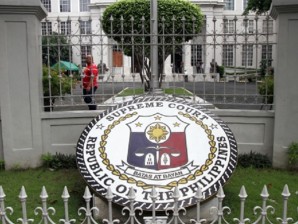
INQUIRER FILE PHOTO
MANILA, Philippines—The Supreme Court has ordered the Office of the Ombudsman to file graft charges against the former Pasig City registrar of deeds and a lawyer over the alteration of 38 condominium certificates of title (CCTs) for a building whose ownership is being disputed by a realty firm and an insurance company.
In a 33-page decision issued July 31 and written by Justice Jose Perez, the Court’s Second Division said there was probable cause for the Ombudsman to charge former registrar Policarpio Espensin and lawyer Francis Serrano with violations of Section 3 (a) and (e) of Republic Act No. 3019 or the Anti-Graft and Corrupt Practices Act.
The court said Espensin was also administratively liable for grave misconduct and should have been dismissed from service for violating the rules of title registration and merely relying on Serrano’s word that the CCTs should be altered.
Division chair Justice Antonio Carpio and members Justices Arturo Brion, Mariano del Castillo and Estela Perlas-Bernabe concurred in the ruling.
The case stemmed from the complaint of businessman Oscar Ampil, an unsecured creditor of a sister company of the ASB Realty Corp., which in 1995 entered into a joint development project with the Malayan Insurance Co. (Mico) for the construction of a condominium, the Malayan Tower, in Ortigas Center.
Under an agreement, Mico contributed the land on which the building would be put up and ASB would acquire ownership after paying P640 million.
In 2000, however, the ASB was unable to fulfil its obligations to Mico after the realty firm’s company filed for rehabilitation proceedings with the Securities and Exchange Commission. Two years later, ASB and Mico again entered into another agreement whereby Mico was to assume the entire responsibility for the development and completion of the tower.
At that time the ASB had already paid Mico around P427 million of the purchase price for the land.
On March 11, 2005, Espensin issued 38 CCTs for 38 units and allotted parking spaces in the name of ASB. However, the same day, he issued another set of CCTs covering the same units, this time in the name of Mico.
Espensin later claimed that Serrano, saying he represented both Mico and ASB, had requested the changes in the ownership of the titles because of simple error. The registrar said he consented as the titles had not yet been issued.
To protect his interests as creditor, Ambil sued Espensin, Serrano and top Mico officials Yvonne Yuchengco and Gema Cheng in the Office of the Ombudsman for falsification of public documents and graft. Ambil said the 38 units were reserved to ASB under its agreement with Mico.
The Ombudsman, however, dismissed the criminal case of falsification due to lack of probable cause.
Ambil also filed an administrative case against Espensin but the Ombudsman found the registrar guilty only of simple misconduct and suspended him for a month. Espensin went to the Court of Appeals which acquitted him of the charge in July 2009.
Ambil elevated both cases to the Supreme Court.
In its ruling, the high court agreed with dismissal of the falsification case but faulted the Ombudsman’s ruling for being silent on the graft aspect, adding that it had been ultimately established that Espensin, at Serrano’s urging, had altered the CCTs.
As registrar, the court said Espensin was tasked to review the deeds and other documents for conformance with the legal requirements of registration. The justices said that when the issuance of the first set of CCTs was recorded on the registry, the law states that these may not be changed without a court order.
“Espensin relied on Serrano’s word alone that a supposed error was committed. The ownership of the units remains in dispute and, by necessary inference, does not lie as well in Mico. By his baseless reliance on Serrano’s word and representation, Espensin allowed Mico to gain an unwarranted advantage and benefit in the titling of the 38 units in the Malayan Tower.”
The ruling added that the court was only dealing with the preliminary investigation aspect of the case and was not ruling on the guilt or lack of guilt of the Espensin and Serrano considering that the dispute was still being threshed out by the Construction Industry Arbitration Commission.
With regard to the administrative case, the Court said Espensin’s actions “clearly demonstrated a disregard of well-known legal rules” and was therefore guilty of grave misconduct punishable by dismissal for service.
As Espensin has already retired from service, the court ordered the forfeiture of all his retirement pay and benefits.